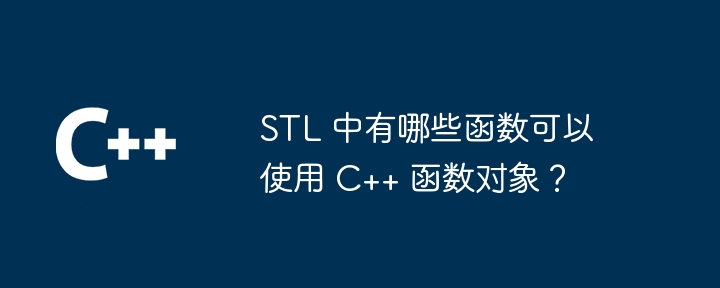
STL provides several functions that accept C function objects as parameters and are used to operate collections or perform specific transformations. These functions include: transform(): Transforms the elements of the collection using the specified function object. for_each(): Performs an operation on each element in the collection, using the specified function object. sort(): Sorts the collection according to the specified comparison function object. find_if(): Find elements that meet the specified conditions (defined by the function object). count_if(): Counts the number of elements that meet the specified conditions (defined by the function object).

Functions in STL that can use C function objects
There are several functions in STL (Standard Template Library) that can accept C function objects as parameters. These functions are typically used to manipulate collections or perform specific transformations. Here are a few common examples:
Practical case
The following code example demonstrates how to use the transform() function object to convert a number to a string:
#include <algorithm>
#include <iostream>
#include <vector>
#include <string>
using namespace std;
int main() {
// 创建一个数字向量
vector<int> numbers = {1, 2, 3, 4, 5};
// 定义一个将数字转换为字符串的函数对象
struct IntToString {
string operator()(int num) const {
return to_string(num);
}
};
// 使用 transform() 将数字向量转换为字符串向量
vector<string> strings;
transform(begin(numbers), end(numbers), back_inserter(strings), IntToString());
// 打印字符串向量
for (const auto &str : strings) {
cout << str << endl;
}
return 0;
}In this example, the IntToString function object defines an operator () that converts an integer to a string. The transform() function uses this as a transformation function to convert a numeric vector into a string vector.
The above is the detailed content of Which functions in STL can use C++ function objects?. For more information, please follow other related articles on the PHP Chinese website!
 What are the differences between c++ and c language
What are the differences between c++ and c language
 Recommended learning order for c++ and python
Recommended learning order for c++ and python
 Cost-effectiveness analysis of learning python and c++
Cost-effectiveness analysis of learning python and c++
 Is c language the same as c++?
Is c language the same as c++?
 Which is better to learn first, c language or c++?
Which is better to learn first, c language or c++?
 The difference and connection between c language and c++
The difference and connection between c language and c++
 C++ software Chinese change tutorial
C++ software Chinese change tutorial
 Cost-effectiveness analysis of learning python, java and c++
Cost-effectiveness analysis of learning python, java and c++




